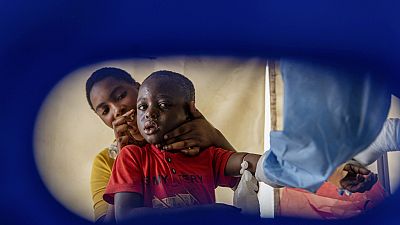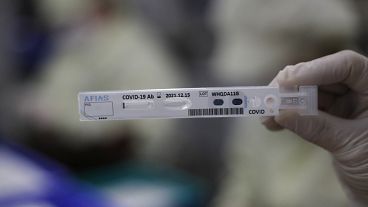Polycystic ovary syndrome is one of the most common health conditions in women of reproductive age. Yet, there is little investment in research and little progress towards the improvement of symptoms and well-being of patients.
Nearly one in seven menstruating people are estimated to suffer from polycystic ovary syndrome (PCOS), with the World Health Organization (WHO) noting this hormonal disorder as a "leading cause" of infertility.
Yet up to 70 per cent of women worldwide are not aware they have this syndrome, according to WHO.
As September marks PCOS awareness month, experts are calling out the lack of research and little progress to improve the symptoms and well-being of patients.
It is estimated that PCOS has an annual cost of approximately €23 billion in the European health sector.
However, the last EU-funded research for PCOS was in 2020.
"There are not a lot of funds allocated to PCOS research," said Emelyne Heluin, vice president of the French Association for women diagnosed with PCOS, SOPK Europe.
Jodie Relf, PCOS dietitian and British Dietetic Association spokesperson, agrees that "one of the biggest gaps that we have is in research".
"We still don't understand enough about the condition," she said.
"We need multi-disciplinary teams that can help these women. We need support from a mental health perspective as well as a diet and lifestyle perspective. There's a lot that still needs to be done".
The condition can cause irregular menstrual periods, fertility problems, excess body hair, weight gain and acne.
People with PCOS are also more likely to develop type 2 diabetes, high blood pressure, high cholesterol, heart disease, and endometrial cancer.
The common ground
Experts say women who go to the doctor for the first time with symptoms of PCOS are often not supported.
"It's always just a case of losing weight or taking the pill with very little kind of regard for how difficult it can be to lose weight with PCOS and how frustrating that journey can be," said Relf.
She was diagnosed with PCOS in her early 20s when she was still completing my dietetics degree.
"I received a diagnosis from a gynaecologist. There was no explanation given. There was no information about how I managed my condition outside of 'take the pill and come back when you want to have children'," she said.
Heluin, meanwhile, was 17 when she was diagnosed and similarly, she had no help with how to navigate this disease: "I just had to go and find out by myself the symptoms I would be living with".
Their experiences fueled their desire to fight misinformation about this topic and help to create a space where other PCOS patients could come to ask for help to better understand and manage symptoms.
"The fact that people will understand and be interested in what you are going through will really make a difference on how you are living with it," said Heluin.
How is PCOS represented around Europe?
In France alone, some 2.5 million women suffer from this syndrome, according to SOPK Europe.
However, the rate of women with this hormonal disorder in Central and Eastern Europe is more than three times higher than in Western countries, according to a 2016 study from Polish researchers.
In 2016, the highest rate per 100,000 cases of women with PCOS was in the Czech Republic (460.6) and the lowest in Sweden (34.10).
The EU with the Horizon 2020 has funded two projects for PCOS so far.
SPIOMET4HEALTHis the only project not focused only on fertility or weight issues.
This five-year project aims to create a single tablet taken daily "to normalise ovulation and endocrine-metabolic status".
It is set to be tested in a clinical trial for adolescent girls and young adult women in different centres including in Spain, Austria, Norway, Italy, Denmark and Turkey.
Heluin is part of the patient advisory board of SPIOMET4HEALTH and is hopeful that this treatment can help "the future generations".
Is the focus on fertility and weight the right one?
Around 40 per cent of women with PCOS are known to experience depression or anxiety, according to multiple studies.
Women with this hormonal disorder also tend to suffer from low self-confidence and self-esteem due to the syndrome's symptoms, such as hirsutism, acne and abnormal body fat distribution.
However, it can also be related to fatigue or sleep disturbances.
"PCOS destroyed so many things in my life. It affected my social life, my love life, my career, my professional career," said Heluin.
"I believe our careers are slowed down by PCOS because we have to go through our days at work with chronic fatigue, anxiety, pelvic pain, and so on".
Some younger patients claim that more dangerous PCOS side effects are overlooked by fertility and weight issues.
"It's just the society we live in. We have a lot of fatphobia going on," said the vice president of SOPK Europe.
The 36-year-old added: "I know this is something that we also have to fight regarding people's perception of PCOS, which is that if you improve your lifestyle, your diet, your exercise regimen, PCOS will go away.
"No, it will not go away. Maybe you will be slimmer, maybe you will relieve some of the symptoms. Maybe it's going to get a bit better, but you will still have PCOS. So, losing weight is not the magic cure for PCOS at all".















